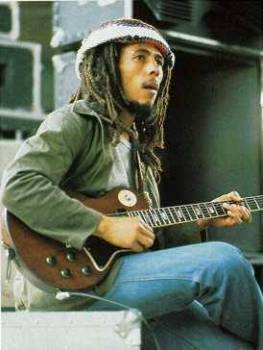| B i o g r a p h y |
 Tremendously
popular in their native Jamaica, where Bob Marley was regarded as a
national hero, the Wailers were also reggae music's most effective
international emissaries. Bob Marley's songs of determination,
rebellion, and faith found an audience all over the world.
Tremendously
popular in their native Jamaica, where Bob Marley was regarded as a
national hero, the Wailers were also reggae music's most effective
international emissaries. Bob Marley's songs of determination,
rebellion, and faith found an audience all over the world.
Marley left his rural home for the slums of Kingston at age 14. When he was 17, Jimmy Cliff [see entry] introduced him to Leslie Kong, who produced Marley’s first single, “Judge Not,” and several other obscure sides. In 1963, with the guidance of Jamaican pop veteran Joe Higgs, Marley formed the Wailers, a vocal quintet, with Peter Tosh, Bunny Livingstone, Junior Braithwaite, and Beverly Kelso. Their first single for producer Coxsone Dodd, “Simmer Down,” was one of the biggest Jamaican hits of 1964, and the Wailers remained on Dodd’s Studio One and Coxsone labels for three years, hitting with “Love and Affection.”
When Braithwaite and Kelso left the group around 1965, the Wailers continued as a trio, Marley, Tosh, and Livingstone trading leads. In spite of the popularity of singles like “Rude Boy,” the artists received few or no royalties, and in 1966 they disbanded. Marley spent most of the following year working in a factory in Newark, Delaware (where his mother had moved in 1963). Upon his return to Jamaica, the Wailers reunited and recorded, with little success, for Dodd and other producers. During this period, the Wailers devoted themselves to the religious sect of Rastafari.
In 1969 they began their three-year association with Lee “Scratch” Perry, who directed them to play their own instruments and expanded their lineup to include Aston and Carlton Barrett, formerly the rhythm section of Perry’s studio band, the Upsetters. Some of the records they made with Perry - like “Trenchtown Rock” - were locally very popular, but so precarious was the Jamaican record industry that the group seemed no closer than before to establishing steady careers. It formed an independent record company, Tuff Gong, in 1971, but the venture foundered when Livingstone was jailed and Marley got caught in a contract commitment to American pop singer Johnny Nash [see entry], who took him to Sweden to write a film score (and later had moderate hits with two Marley compositions, “Guava Jelly” and “Stir It Up”).
 In
1972 Chris Blackwell - who had released “Judge Not” in
England in 1963 - signed the Wailers to Island Records and advanced
them the money to record themselves in Jamaica. Catch a Fire was their
first album marketed outside Jamaica, which featured several uncredited
performances such as Muscles Shoals’ guitarist Wayne Perkins
playing lead on “Concrete Jungle” and “Stir It
Up.” (They continued to release Jamaica-only singles on Tuff
Gong.) Their recognition abroad was abetted by Eric Clapton’s hit
version of “I Shot the Sheriff,” a song from their second
Island album. They made their first overseas tour in 1973, but before
the end of the year, Tosh and Livingstone (who later adopted the
surname Wailer) left for solo careers.
In
1972 Chris Blackwell - who had released “Judge Not” in
England in 1963 - signed the Wailers to Island Records and advanced
them the money to record themselves in Jamaica. Catch a Fire was their
first album marketed outside Jamaica, which featured several uncredited
performances such as Muscles Shoals’ guitarist Wayne Perkins
playing lead on “Concrete Jungle” and “Stir It
Up.” (They continued to release Jamaica-only singles on Tuff
Gong.) Their recognition abroad was abetted by Eric Clapton’s hit
version of “I Shot the Sheriff,” a song from their second
Island album. They made their first overseas tour in 1973, but before
the end of the year, Tosh and Livingstone (who later adopted the
surname Wailer) left for solo careers.
Marley expanded the instrumental section of the group and brought in a female vocal trio, the I-Threes, which included his wife, Rita. Now called Bob Marley and the Wailers, they toured Europe, Africa, and the Americas, building especially strong followings in the U.K., Scandinavia, and Africa. They had U.K. Top 40 hits with “No Woman No Cry” (1975), “Exodus” (1977), “Waiting in Vain” (1977), and “Satisfy My Soul” (1978); and British Top 10 hits with “Jamming” (1977), “Punky Reggae Party” (1977), and “Is This Love” (1978).
In the U.S., only “Roots, Rock, Reggae” made the pop chart (#51, 1976), while “Could You Be Loved” placed on the soul charts (#56 R&B, 1980), but the group attracted an ever larger audience: Rastaman Vibration went to #8 pop and Exodus hit #20. In Jamaica the Wailers reached unprecedented levels of popularity and influence, and Marley’s pronouncements on public issues were accorded the attention usually reserved for political or religious leaders. In 1976 he was wounded in an assassination attempt.
A 1980 tour of the U.S. was canceled when Marley collapsed while
jogging in New York’s Central Park. It was discovered that he had
developed brain, lung, and liver cancer; it killed him eight months
later. In 1987 both Peter Tosh and longtime Marley drummer Carlton
Barrett were murdered in Jamaica during separate incidents. Rita Marley
continues to tour, record, and run the Tuff Gong studios and record
company.
Marley was a pioneer not only because he single-handedly brought
reggae to the world, but because his passionate, socially observant
music has become a yardstick against which all reggae will forever be
measured.
From The Rolling Stone Encyclopedia of Rock & Roll (Simon and Schuster, 2001)